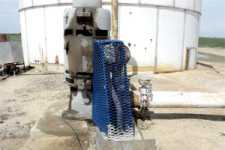Growers Targeted For Copper Theft

After hearing forecasts about metal prices, Walt Reed is gearing up for a busy summer. Reed is a Kern County (CA) Sheriff’s Sergeant with the Central Valley Rural Crime Prevention Task Force, and he expects metal thefts, already a big problem, to get even worse. “Copper wire is already roughly $4 a pound, and I’m told it will go as high as $5 this summer,” he says. “Basically, that means ‘Hang on.’”
The south end of the San Joaquin Valley, where Reed is based, is rich with vineyards and tree fruit and nut orchards. It’s also extremely hot in the summer, which means growers have to frequently irrigate. Their usually unattended wells make tempting targets for thieves because of the copper wire that carries the electricity to power them.
Exacerbating the problem is that the people stealing the copper and other metals are often desperate. While professional thieves pull off some of the big jobs, Reed says that most of the guys hitting the wells are methamphetamine addicts. “They’ve taken an acetylene torch to a plow just for the metal,” he says.
Most thieves won’t use a tool like a torch, either because they don’t have access or they don’t want to draw attention, says Reed. In the average case, they will dig up the wiring at one end, cut it, wrap around a car bumper, and then basically tow it out of the ground.
Costly Crime
While the orchards and vineyards may be isolated, the crimes definitely are not. In fact, Reed says since December the value of the metal thefts — mainly copper wire — have been averaging $80,000 a week. They’ve been increasing in recent years, and that’s attributed to two factors, the continued ailing economy and increased methamphetamine use.
And that’s just the cost of the metal. There are also growers’ costs in fixing pumps and other equipment. “Also, the farmer has to irrigate, and if the pump doesn’t work, what does that do to the overall yield of the crop?” says Reed. “We’re not even factoring those losses into that ($80,000) figure at this point.”
Another part of the problem is that while a law was passed a few years ago against metal theft, mandating such steps as photographing the recycled items and the recycler, thieves have found a way around it. The thieves are selling metal to people who function as middlemen, so the thieves themselves are never photographed.
Protect Yourself
Many of the thieves will pretend to be interested in old farm equipment. To protect yourself, take down the license plate of any vehicle that comes on your property or is cruising slowly around the perimeter. “Trust your instincts; if it looks like a duck and walks like a duck, it probably is a duck,” he says.
Also, farmers are notorious for not throwing anything away. “If you have a big pile of scrap, it’s almost like bait,” says Reed. “Toss it, recycle it.”
Finally, realize that while you might not be able to stop such thefts, you may be able to stop them on your own property. The thieves will take the path of least resistance, so put cages or metal domes over access points. “If you take enough preventative measures, you can push them off to your neighbor,” says Reed. “I don’t like saying that, but it’s true, and it’s a dog-eat-dog world.”
For 10 tips to help deter copper theft, keep reading.
Ten Tips To Deter Copper Theft
To combat metal theft problems, at least 28 states and scores of municipalities around the country have passed laws tightening the restrictions on scrap dealers, according to Nationwide Mutual Insurance Company. In some instances, purchases of scrap metal are required to be held in reserve for a week or more before being resold in case it has been stolen. Some states require dealers to record the seller’s name, address, and driver’s license. Still, the best defense is to prevent metal theft at the source. Consider these 10 measures:
1. Protect fixtures (such as pump units) with locked metal cages.
2. Secure all equipment in locked buildings, or in well-lit areas
secured by fencing.
3. Mark metals with the company’s name using paint, hard-to-remove decals, or engraving equipment.
4. Make sure someone is present when supplies such as copper wiring or pipe are delivered at a job site so the materials can be immediately secured.
5. Don’t receive supplies earlier than you need them. The longer metal is on site and unused, the longer it’s at risk of theft.
6. Develop a relationship with local law enforcement. Ask for their guidance in preventing metal theft at your business and what to do in the event a theft occurs.
7. Increase lighting outside, and install a security camera with a video recorder and keep recordings for a sufficient period.
8. Post “No Trespassing” placards around the property or signs indicating the presence of a surveillance or security system to deter thieves. Even with non-active systems, these signs tend to discourage some instances of metal theft.
9. Create a master list of all of your equipment and bulk metal (if applicable) and include pictures. Providing the list to your agent and the authorities might help in recovering the items.
10. Talk with your insurance agent. Make sure you have adequate insurance to cover metal theft, and be sure to update your agent as your business changes.
Source: Nationwide Mutual Insurance Company









